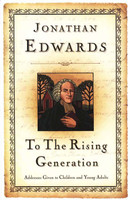
Addresses to Young Men (James)
- Affordable shipping (free $100+)
- 100,000+ customers served
- "Wonderful books, great prices, awesome customer service." – Ivan, IL
Description
John Angell James provides a friendly guide through life for young men. Taking account of the duties, temptations, and complications involved in growing into male adulthood, James shows how prayer and faith offer access to the truth, power, and love of God necessary to grow up respected by others and equipped for this life and the next.
Contents
The Young Man’s Friend and Guide through Life to Immortality
- Preparation for Life
- Entrance upon Life
- Indecision as to Religion
- Amiability without Religion
- Perplexity from Religious Controversies
- The Character of Joseph
- The Study of the Book of Proverbs
- Success or Failure in Business
- Emigration
- Disappointment or Fulfilment of the Hopes of Friends
- The Importance of the Present Age
- Death in Youth and the Review of Life in Old Age
The Young Man from Home
- Introduction
- The Time of Leaving Home a Critical Period
- Sources of Danger
- Sources of Danger Continued
- The Successive Steps of Going Astray
- Dangers of a Minor Kind
- The Means of Safety
- Religion a Preservative from Sin
- Religion a Source of Comfort and Happiness
- Religion a Means of Promoting the Temporal Interests of Its Possessor
- Religion a Means of Usefulness
- Religion a Preparation for Superintending a Home upon Earth, and for an Eternal Home in Heaven
- Several Classes of Young Men Specially Addressed: Emigrants, Orphans, Religious Young Men, and Prodigals
Endorsement
“Especially must I mention the name of that honoured father of all the Dissenting churches, the Rev. John Angell James, of Birmingham. There is no name I think just now that ought to be more venerated than his.”
—Charles Haddon Spurgeon at the ceremony for laying the Metropolitan Tabernacle foundation stone
About the Author
John Angell James (1785–1859) was a Congregationalist Nonconformist pastor at Carrs Lane Chapel in Birmingham, England. He also chaired the board of education of what was to become Mansfield College, Oxford. He was awarded honorary doctorates by both Princeton and Glasgow Universities. A staunch Calvinist steeped in practical piety, he preached and wrote to the average person saying, “I write plain truths, in plain language, for plain people!”





